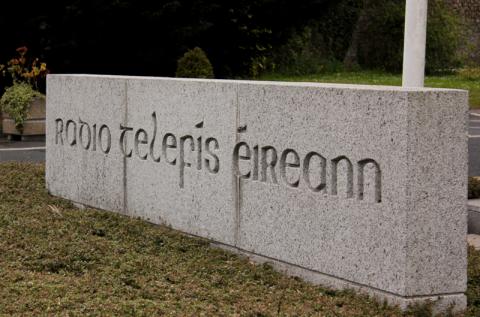More crises coming down the tracks for RTÉ

RTÉ is in the throes of a nervous breakdown - and it is hardly surprising. The Fr Kevin Reynolds debacle, the threat of further libel suits arising from the Mission to Prey fiasco, the station's financial crisis and the prospect of more scandals on the way would unsettle even a Catholic bishop.
All this is aided and abetted by incompetence within and without. Within, by management and the RTÉ Authority. Without, by the Broadcasting Authority of Ireland (BAI) - the inadequate and unfairly conducted "investigation" - and then Pat Rabbitte, who failed to institute an appropriate inquiry, and then huffed and puffed about the Authority (and then un-huffed and un-puffed).
A crisis that seems likely soon to break concerns RTÉ's commercial practices, which are alleged to have been unlawful and which may end up costing the station even more millions of euro.
This possibility arises from a preliminary decision (officially, an enforcement decision) of the Competition Authority on a complaint made about RTÉ's television advertising sales practices, which the Competition Authority reported on last January.
The Competition Authority stated that it was "of the preliminary view that the operation of (advertising sales practices) may have (effects) which could amount to unlawful conduct by RTÉ in the market for television advertising airtime in the state", contrary to Section 5 of the 2002 Competition Act and/or Article 102 of the TFEU (Treaty on the Functioning of the European Union). Section 5 of the Act relates to abuse of a dominant position. Meanwhile, Section 7 states: "An undertaking that acts in a manner prohibited by section 5 (i) shall be guilty of an offence."
Section 14 of the act states that anyone who is "aggrieved in consequence of (an abuse of a dominant position) shall have a right of action" against the undertaking which engaged in the abuse and/or any director, manager or other officer of such an undertaking, who authorised or consented to the practice.
The practice concerned the sale of TV advertising slots (or 'impacts'), with incentive discounts for advertising clients who agreed to book most of their advertising spend with RTÉ.
The Competition Authority investigation arose from a complaint by TV3 alleging that RTÉ was engaging in anti-competitive behaviour, in breach of Irish and European competition law. The authority took the "preliminary view" that RTÉ was likely to have a dominant position in the market for television advertising and that its sales practices were "capable of foreclosing RTÉ's competitors".
The Competition Authority did not make a final determination about the complaint because RTÉ promised to cease the practice that the Competition Authority suggested was abusive. RTÉ's conduct deprived TV3, its major competitor for television advertising, of very significant revenues, and it is my understanding that TV3 is considering legal action against RTÉ arising from this practice that has persisted for ten years. So there is a prospect of RTÉ having to pay out many more millions in damages.
(Here, I should declare a conflict of interest: I work for TV3, but I have expressed critical views of RTÉ's dominant position in the media market for many years, including the 11-year period during which I worked for RTÉ.)
The RTÉ Authority's conduct in the face of the Mission to Prey calamity was characteristic of RTÉ authorities throughout the decades.
I thought that Tom Savage's appointment as its chairman was inspired, because he is an accomplished strategist. He knows RTÉ and its culture, and he is robustly independent – all qualities RTÉ needed at a time of very great transformation.
Yet Savage and his colleagues on the current Authority seem to have been co-opted into the RTÉ "groupthink", just as all previous authorities seem to have been.
Savage said last week that the authority knew nothing about any problem with Mission To Prey until the station was about to capitulate in the face of the libel action last September.
Did he, or anyone else on the Authority, not think there was anything curious about the revelation on the programme that Fr Kevin Reynolds had strenuously denied the allegation that he had fathered a child by a Kenyan woman he had allegedly raped?
Did none of them enquire, in the aftermath of the broadcast, what proof the programme team had to support the allegation? Or what oversight the legal affairs office in RTÉ had of the broadcast?
I am not talking here of micro-management. I am talking of appropriate oversight. And how was it that, while RTÉ management was stonewalling Reynolds and his pesky solicitor, nobody on the Authority got wind of the impending disaster?
There was a casual insight in the BAI report which, in my opinion, revealed the calibre of RTÉ editorial management in the arena, which has been proclaimed as RTÉ's centre of journalistic excellence.
The revelation was that the practice in Prime Time Investigates was for reporters, not editorial management, to come up with stories to be investigated.
It suggests no focus in Prime Time Investigates on what the story was about or the area it should be investigating, and no clear idea that the point of the exercise was to hold powerful institutions and persons accountable - rather than foreign taxi drivers or alleged social welfare fraudsters.
Meanwhile, coming down the tracks are a substantial libel action being taken by Declan Ganley against Prime Time Investigates, and the possibility of a libel action arising from another programme on the Lees Cross nursing home.
More Valium required! {jathumbnailoff}
Image top: Eadaoin O'Sullivan.
